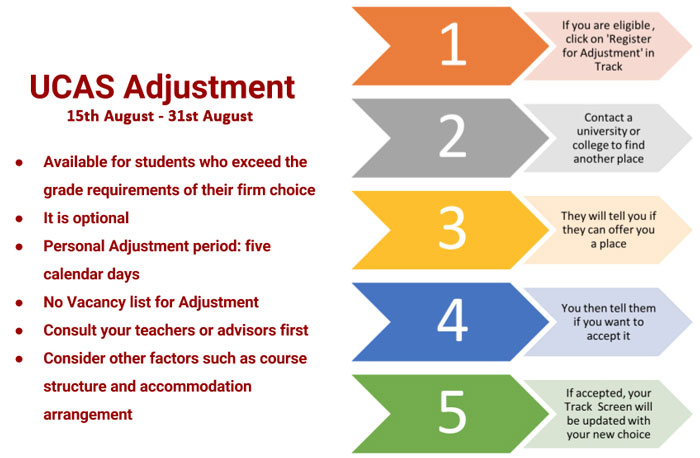UCAS Adjustment was a system that allowed prospective students to apply for a course with higher entry requirements if their grades were higher than anticipated.
For entry beginning in September 2022 and later, UCAS has eliminated the Adjustment process. Accordingly, you must use the UCAS Self Release system on the UCAS Hub if you want to switch your university of choice after receiving your results in August 2022 (July for some qualifications). UCAS Adjustment will be discussed for you in this article. Please keep reading.
Describe UCAS Adjustment
Some of you might discover on results day that you’ve performed better than expected and surpassed the requirements of your firm offer. As long as you met the entry requirements, adjustment gave you the chance to apply for a different course or university. This implied the opportunity to apply to a college or course that had previously rejected you or demanded grades you weren’t expected to achieve.
From the day the Level results were announced until about a week later, adjustment was possible. A “Register for Adjustment” option would have been present in your UCAS Track profile if you were qualified for adjustment.
The Self Release option is accessible from the end of Clearing through early September every year, which is longer than the previous Adjustment procedure. It gives you the option of selecting a different university while letting go of your initial top-choice course.

Remember:
- If you decide to attend somewhere else, for example, if your plans change, through Clearing, make sure your decisions are measured and rational
- If you want to live away from home, make sure to check accommodation availability before making any agreements with a university or UCAS
- The adjustment was useful in larger cities where there were two or more universities in close proximity, and it was easy to switch universities if accommodation isn’t an issue
What’s The Process Of UCAS Adjustment?
Through the UCAS Track system, applicants for Adjustment are registered. After that, you had five days (including weekends) to use it beginning on the day your conditional firm (CF) offer becomes an unconditional firm (UF), or on A-level results day, whichever came first.
You only had the remaining time up until August 31 to use Adjustment and find another university spot if your offer was made unconditional less than five days before that date.
Who Is Eligible To Apply For UCAS Adjustment?
Any student who met the criteria for their conditional offer but went above and beyond could apply for Adjustment, including BTEC students and those pursuing alternative qualifications. As soon as your firm choice on results day became unconditional, you could register using your UCAS Track account.
How Is UCAS Adjustment Different From UCAS Clearing?
In two key ways, UCAS adjustment differs from clearing. When students don’t get the grades they need to enroll in their top universities, they can use the UCAS clearing process. For students whose grades exceeded their expectations or predictions, an adjustment may be necessary.
Students who have received more offers than they can handle have the option to adjust, which gives them the chance to try to get into a university with more stringent admissions standards. Students who changed their minds and want to apply to a completely different course can also do so.
UCAS does not offer a centralized search tool for courses eligible for adjustment, unlike clearing, and it does not automatically enroll you in the adjustment process. In order to learn if there are any openings, students will now need to speak with each university directly.
FAQs
How Do You Accept An Adjustment Offer?
The university will send you a confirmation letter and update your Track account, automatically removing your original offer, if you choose to accept a verbal offer.
What Distinguishes Adjustment From Clearing?
Although both give students the chance to find a different university or course, Clearing is for students who haven’t been able to meet the conditions of their conditional offer, and Adjustment is for students who have met or exceeded the conditions.
What Happens To Your Initial Offer After The Adjustment Process?
Once you accept a verbal offer through Adjustment, your conditional offer will no longer be valid. Your initial selection will therefore remain if you don’t make another decision within the five-day Adjustment period.
What Happens If You Decide Against Accepting Your Adjustment Offer?
Your original offer will be automatically rejected if you accept one made through Adjustment. You can, however, decline your new offer if you change your mind. There is no assurance that your place will still be open, so you will need to get in touch with your original university.
